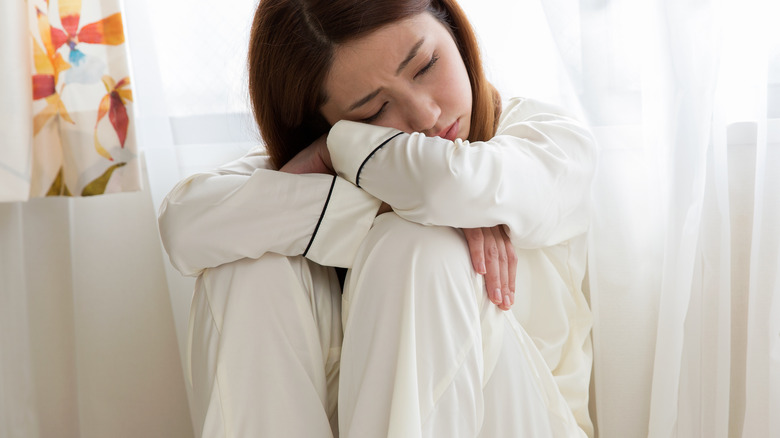Dr. Trevor Cates Reveals The No. 1 Way Women's Bodies Change In The Fall - Exclusive
We may receive a commission on purchases made from links.
From sipping on pumpkin spiced lattes to rocking those cute new boots, fall is the season with several reasons to fall in love with the simpler things in life. Autumn does bring one caveat though — less sunlight. As the days get shorter and the nights get longer, it might seem impossible to fit in that post-work run before the sun sets. Per Bustle, the shift in day and nighttime hours can also cause us to sleep more and wake up groggy, as the reduction in exposure to ultraviolet light can disturb our circadian rhythm. The human body relies on daylight as a cue to when the body should be awake and when it should wind down for bed.
Furthermore, women's health expert Dr. Kirtly Parker Jones told the University of Utah Health that melatonin, a naturally-occurring hormone in the brain that's responsible for making you go to sleep, is produced during the nighttime when it's dark. With that said, the longer nights of fall and winter can cause an increase in melatonin levels which can also further upset the circadian rhythm, making people more sleepy and prone to depression.
However, there's one change that impacts women's bodies the most during fall. Utah-based Dr. Trevor Cates, who specializes in naturopathic medicine, wrote about this phenomenon that predominantly impacts women, as well as other seasonal changes women face, in her book titled "Natural Beauty Reset." Cates spoke exclusively to The List about this significant change women's bodies go through when transitioning into fall.
Women face lower serotonin levels in the fall
Dr. Trevor Cates tells us that with autumn, women's serotonin levels tend to decline. "The darker days of fall can cause a drop in serotonin, which is part of the reason many women may notice a shift in their mood and not feel as sunny as they did in summer months," Cates told us. Per Mayo Clinic, the decrease in serotonin is a result of the reduction in sunlight that occurs during autumn and winter, which can manifest as Seasonal Affective Disorder (SAD). SAD is a form of depression that occurs seasonally, typically during the fall and winter months.
According to the University of Utah Health, SAD tends to impact women more than men. Dr. Kirtly Parker Jones told the University of Utah that roughly one in 20 people experience SAD. Jones added that four out of every five people who have SAD are women. Symptoms include feelings of worthlessness, oversleeping, and reduced energy.
Everyday Health reports the decrease in serotonin levels that causes SAD can also result in weight gain. The Journal of Affective Disorders states that lower serotonin levels can lead to a lack of motivation to exercise. Furthermore, according to a journal published in Comprehensive Psychiatry, people with SAD tend to gravitate toward sugars and starchy carbohydrates to compensate for the lack of serotonin. While high-glycemic carbohydrates can boost your serotonin, there are healthier options that can naturally increase serotonin levels.
Eating healthy can help manage your serotonin levels
It turns out that there's some truth to the idea that "you are what you eat." And that's good news, since it means you have the ability to manage your serotonin levels. Dr. Trevor Cates told us, "Since 90% of serotonin receptors are actually in the gut, what you eat does make a difference in mood."
Serotonin is a neurotransmitter, which means it essentially acts as one of the body's messengers in communicating between different parts of the brain, as well as delivering messages to blood platelets and the digestive tract (per the University of California San Diego Health). According to a report published in the European Review for Medical and Pharmacological Sciences, serotonin even "directly controls the gastrointestinal system" by activating neurons in the enteric nervous system that are responsible for bowel movements.
Managing this gut-brain connection by eating foods that promote serotonin production is key to reducing the impacts of Seasonal Affective Disorder (SAD). To naturally increase serotonin levels, it's recommended to eat foods rich in tryptophan. Tryptophan is an amino acid, from which serotonin is synthesized, and is found in protein-rich food like dairy products, pumpkin seeds, peanuts, egg whites, fish, and turkey.
Balance is key in managing serotonin levels
Balancing out the tryptophan with low-glycemic carbohydrates and vitamin B is important in allowing "tryptophan to pass the blood-brain barrier" and in encouraging the production of serotonin, respectively (via the University of California San Diego Health). Vitamin B-rich foods include poultry, dairy, leafy green vegetables, beans, and breads. The reduced sunlight that comes with fall and winter can also result in vitamin D deficiencies, per the University of Utah Health, so Dr. Kirtly Parker Jones suggests eating salmon and eggs.
Practicing mindful eating is also crucial in making sure you're not overeating as a result of the drop in serotonin levels. Registered dietitian Kim Yawitz told Everyday Health, "If you've eaten recently and you're not having any physical signs of hunger like a growling stomach, consider whether you might actually be sad, lonely, or anxious rather than hungry." To stave off any junk food cravings, Yawtiz suggests meditating, taking a bath, or going on a brisk walk.
Buying a "happy light" that replicates natural sunlight can also help people who deal with Seasonal Affective Disorder and live in areas that especially experience reduced sunlight hours. One journal published in The European Review for Medical and Pharmacological Sciences also recommended trying negative ion therapy to help make you feel more positive. This fall, if you have SAD, you'll be glad to try eating foods that will naturally promote serotonin production.



